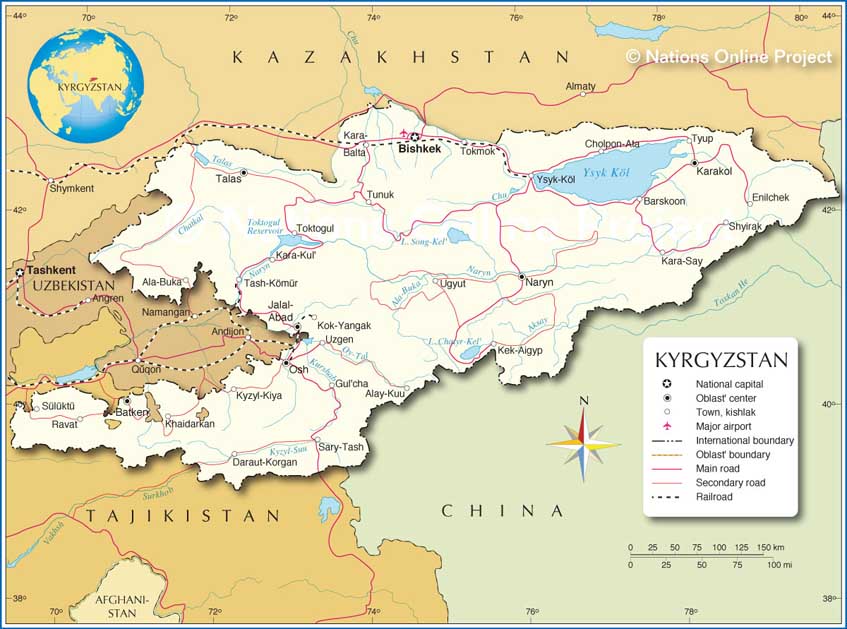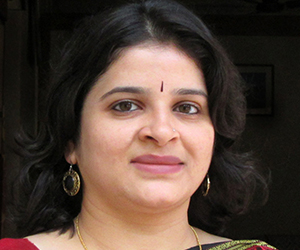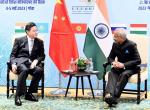Kyrgyzstan, a small, landlocked and mountainous republic in Central Asia, is less known to the world because of its remote location and tiny population (about 6 million). The country borders China on the east and three Central Asian Republics (CARs) on other three sides. It figures prominently in China’s Belt and Road Initiative (BRI). It is also very closely inclined towards Russia and is member of Russian-led organizations like Eurasian Economic Union (EEU) and Collective Security Treaty Organization (CSTO). It is also one of the source countries of the Central Asia-South Asia (CASA-1000) project that proposes to transmit electricity from Kyrgyzstan and Tajikistan to energy-starving Afghanistan and Pakistan.
Kyrgyzstan is also a member of the Shanghai Cooperation Organization (SCO), which India has recently joined. In fact, India’s candidature to the SCO was supported by Kyrgyzstan. The two countries have developed cooperation in the areas of defence, security, elections, Information Technology, human resource development, culture, agriculture and tourism. India has also offered Kyrgyzstan training and cooperation in electoral and parliamentary matters. Indo-Kyrgyz joint military exercises called Khanjar have become an annual event.
For all the above reasons, it becomes necessary to keep an eye on socio-political and economic developments within Kyrgyzstan. Recent political instability, which is discussed in this article, has posed a serious challenge for the Kyrgyz leadership.
Kyrgyzstan is shaken by political instability in last one month. President Sooronbay Jeenbekov has recently dismissed the government led by Prime Minister (PM) Sapar Isakov after the Parliament passed a no-confidence motion against him. This is for the first time in the history of the Kyrgyz Republic that Cabinet of ministers had to resign because of the Parliamentary action1. On 20 April 2018, after the vote in the house, President appointed Muhammadkali Abdulgaziyev, former head of President’s office, as country’s 30th PM2. Interestingly, the 27 years old country has had 30 PMs so far, which clearly reflects its political vulnerabilities. Current developments are reflective of the ongoing power struggle between President Jeenbekov and his predecessor Almazbek Atambayev.
Background: Political Instability in Kyrgyzstan
Kyrgyzstan has gone through a great degree of political upheaval in last 15 years, which includes two violent revolutions and devastating ethnic riots between the Kyrgyz and Uzbeks in 2010. A new constitution, adopted immediately after the 2010 revolution, declared Kyrgyzstan a Parliamentary Democracy, making it a standalone case in the former Soviet space. Accordingly, some powers were transferred from President to the Parliament. Presidential tenure was also restricted to one term of six years. Atambayev became the first Kyrgyz President after the adoption of the new constitution.
When Atambayev took over the country in 2011, it was full of chaos and confusion. However, he was successful in restoring peace and stability in Kyrgyzstan. He decided to step down at the end of his tenure, adhering to the constitutional provision of only one term for the president. This in itself was an outstanding case against the other Central Asian rulers, who have amended their respective constitutions from time to time to extend their tenures. Atambayev and his Social Democratic Party of Kyrgyzstan (SDPK) chose the then Prime Minister Sooronbay Jeenbekov as their presidential candidate. His candidature was opposed by many within the party. However, Atambayev eventually pacified the factions. In the nutshell, Jeenbekov was clearly seen as President’s chosen successor.
In the national election on 15 October 2017, Jeenbekov was elected the new President, as he received 54 percent of total votes. His most prominent rival, Omurbek Babanov of the Respublika Party received 33 percent votes3. This election was significant for Kyrgyzstan, as it facilitated nation’s first ever peaceful transition through the ballot. Even though there occurred a lot of mud-sliding between the candidates during the campaigns, election took place in comparatively peaceful manner. After coming to power, Jeenbekov faced challenges like maintaining peace and stability, eradicating poverty and corruption, and implementing policies for the welfare of the common people.
Post-2017 Elections Developments
Within six months of his tenure, Jeenbekov is facing the challenge of political instability, within the parliament as well as his party. During his election campaigns, Jeenbekov had promised to continue the policies and programs of Atambayev4. However, recent developments have shown that Jeenbekov is clearly in a tussle with his predecessor, who still holds considerable support amongst his party members, parliamentarians and mainly government officials. On 31 March 2018, Atambayev was elected the SDPK chief in a closed-door party congress. On the same day, he also harshly criticized his successor for ‘autocracy, corruption and deviation from a political program presented to voters’5. This brought to fore the political fight between the two.
In reality, Atambayev had himself picked Jeenbekov to be his successor, with the clear intention that the later would carry forward his policies, and will govern with the help of all Atambayev’s appointees in office6. This way Atambayev could also retain his power and influence on the larger political scene of the country. Nonetheless, after elections, Jeenbekov seems to have chosen a different path and openly invited former president’s dissatisfaction and anger. Similarly, speculations about Atambayev’s exit from politics were washed away with his election as SDPK chief.
In last one month, Jeenbekov has dismissed several high-level officials. President’s chief of staff Farid Niyazov, chairman and deputy chairman of the State Committee for National Security, director of the National Security Risk Analysis and Forecasting Service, and the Attorney General were also dismissed recently7. All these officials were appointed by Atambayev, and are considered his close aides. Incidentally, Jeenbekov did not touch them during first four months in office; and started the drive only after the outbreak of clash with his predecessor.
First Deputy PM Shadiyev had also resigned from his post in the first week of April, as he was being interrogated by the courts in the corruption case8. In last two months, a number of corruption cases were opened, which led to some high-profile arrests. As a matter of fact, the anti-corruption drive started by Atambayev, and Jeenbekov is now claiming that he is following his predecessor’s footprints. However, there are allegations that this is done to get rid of Atambayev loyalists.
In a landmark development, President Jeenbekov has recently dismissed the government led by PM Sapar Isakov, after the Parliament passed a no-confidence motion. Isakov had become PM in August 2017, after Jeenbekov’s resignation to prepare for the race of presidency. At the age of 40, Isakov was the youngest PM of Kyrgyzstan. However, in recent months, he was subject to fierce criticism, mainly based on inefficiency and corruption charges on his cabinet colleagues. He was also criticized for ‘inaction’ during the recent accident at a thermal power plant in Bishkek, which led to energy cuts during the winters.
Within a week of Isakov’s dismissal, a new cabinet was appointed by Jeenbekov through a decree. This government was elected by the Parliament in a majority vote. Muhammadkali Abdulgaziyev, former head of President’s office, has now become country’s 30th PM. He served as country’s First Deputy PM in 2016-17, under the prime ministership of Jeenbekov9. Similarly, more than half of the cabinet is changed, including the four deputy PMs.
The ongoing tussle between the two leaders has led to serious factions within the party and in the Parliament. The opposition parties like Respublika, which brought the vote of no-confidence against Isakov’s government, have voted overwhelmingly in support of the new cabinet. This has started a new crisis within the Kyrgyz politics, which can worsen in the near future.
Conclusion
In Kyrgyzstan, the Political fabric is too delicate. The country abruptly adopted parliamentary democracy in 2010; however, it lacked the expertise and experience in this regard. Even after seven years, there is still a lot of confusion regarding the sharing of power between executives and legislature. In spite of adopting parliamentary democracy, the President is directly elected by the people and holds considerable powers vis-à-vis the parliament. By holding a national referendum, some powers were shifted from the President to the PM in December 2016. Nevertheless, this power structure will take some more time to stabilize. Until then, confusion and instability will linger.
In the emerging setup, the PM is becoming more powerful, and is responsible along with his deputies and cabinet colleagues, for implementing policies. But the PM is neither directly elected by people, nor does he belong to the Parliament, which leads to lack of answerability.
Since 2010, PMs have been changed seven times. Such frequent transfer of power is not healthy for any democratic setup. The new person, however, experienced he might be, takes time to adjust with his new job, which hampers administration. Out of previous six PMs in Kyrgyzstan, barring Jeenbekov who left PM’s office to run for the presidency, five were dismissed by the President due to their inefficiency.
Kyrgyz politics is overwhelmingly suffering from instability, chaos and uncertainty. The stances of political parties and factions are generally influenced by their leaders’ personal egos and grudges. For example, if a person has had any clash with President Atambayev while he was in office, he and his faction shall support the new president. In the current scenario, most of the members of the parliament, including the opposition, seem to be on president’s side. But things will not be the same in the years to come.
Jeenbekov was directly elected by an overwhelming majority by the people of the country. So he enjoys the solid ground to be in office for next six years. However, the clash between various branches of government and departments will be the main challenge before him. Atambayev still holds a lot of support at national as well as international level. People are divided between supporters of Atambayev and Jeenbekov, and these divisions will take time to fade. A small, landlocked, mountainous, poor country like Kyrgyzstan cannot afford to plunge into such political turmoil. The nation has already gone through such crises in past and has suffered heavy tolls. The political leadership is expected to show more maturity and statesmanship, and unite to focus on country’s development.
References
1. Ali Mustafayev, “First time in history of Kyrgyzstan cabinet of ministers resigns due to no confidence vote”, Trend News Agency , 10 April 2018, URL: https://en.trend.az/casia/kyrgyzstan/2890101.html, Accessed 21 April 2018.
2. Maria Levina, “Kyrgyzstan has 30th Cabinet for 26 Years of Independence”, Times of Central Asia, URL: https://www.timesca.com/index.php/news/26-opinion-head/19645-kyrgyzstan-has-30th-cabinet-for-28-years-of-independence, Accessed 24 April 2018.
3. “New President of Kyrgyzstan Elected in the First Round”, Kabar- Kyrgyz National News Agency, 15 October 2017, URL: http://kabar.kg/eng/news/new-president-of-kyrgyzstan-elected-in-the-first-round/, Accessed 24 October 2017.
4. “First Interview of Kyrgyz President-elect”, Kabar- Kyrgyz National News Agency, 30 October 2017, URL: http://kabar.kg/eng/news/first-interview-of-kyrgyz-president-elect-i-will-do-everything-to-justify-peoples-trust, Accessed 31 October 2017.
5. Ali Mustafayev, “Head of the National Security Committee of Kyrgyzstan dismissed”, Trend News Agency, 07 April 2018, URL: https://en.trend.az/casia/kyrgyzstan/2883793.html, Accessed 24 April 2018.
6. Bruce Pannier, “Won’t Fade Away: Former, Current Kyrgyz Presidents On Collision Course”, Radio Free Europe, 04 April 2018, URL: https://www.rferl.org/a/qishloq-ovozi-kyrgyzstan-atambaev-jeenbekov-collision-course/29144713.html, Accessed 21 April 2018.
7. Ali Mustafayev, No. 5.
8. Chris Rickleton, No, 7.
9. Maria Levina, No. 2.
(Views expressed are of the author and do not necessarily reflect the views of the VIF)
Image Source: http://www.nationsonline.org/maps/kyrgyzstan-political-map.jpg











Post new comment